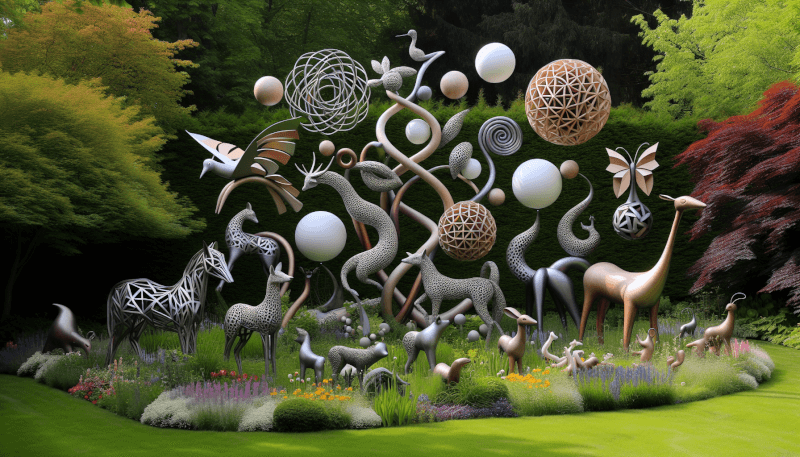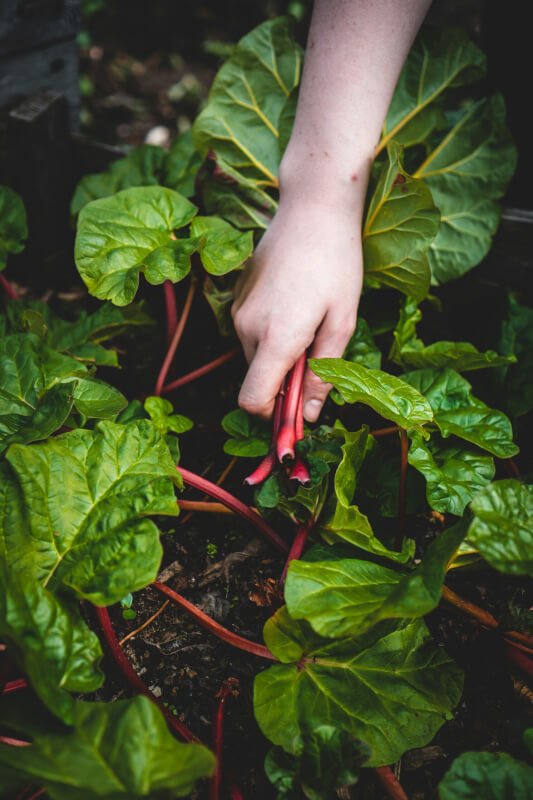Get ready to transform your garden into a captivating work of art with these DIY garden sculpture ideas for artistic expression. From whimsical sculptures made out of recycled materials to elegant stone structures, there are countless ways to add a touch of creativity and personality to your outdoor space. Whether you’re a seasoned artist or simply looking for a fun weekend project, these ideas will inspire you to think outside the box and create stunning focal points that will leave your neighbors in awe. So roll up your sleeves, grab your favorite tools, and let your imagination run wild as you embark on your own sculpting adventure.
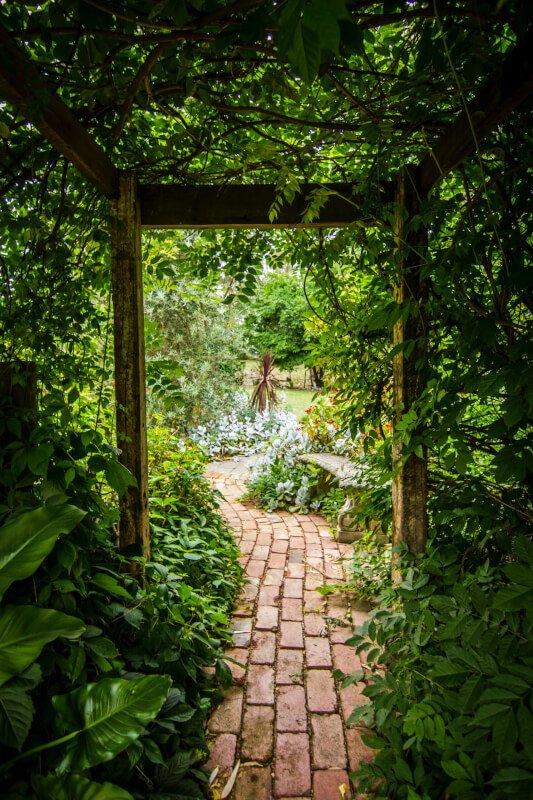
Materials for DIY Garden Sculptures
When it comes to creating DIY garden sculptures, there are several materials that you can choose from. Each material offers its own unique characteristics and benefits, allowing you to unleash your creativity and bring your artistic vision to life in your outdoor space.
Metal
Metal sculptures have a timeless and elegant appeal that can enhance the beauty of any garden. You can work with various types of metal, such as copper, steel, or iron, depending on the desired effect. Metal sculptures can be created through techniques such as welding, wire framing, or cutouts from sheet metal. They can range from abstract designs to more figurative or whimsical creations.
Wood
Wooden sculptures have a warm and natural feel that can add a rustic charm to your garden. There are various types of wood that you can use, such as cedar, pine, or driftwood, each offering its own unique texture and color. Wooden sculptures can be carved, assembled, or even created from tree stumps or driftwood found in nature. They can take the form of totem poles, animal sculptures, or even functional pieces like planters with sculptural elements.
Clay
Clay sculptures offer a versatile and tactile medium for creating garden art. Working with clay allows you to shape and mold your sculptures, giving them a three-dimensional and organic feel. Clay sculptures can be fired and glazed to create durable pieces that can withstand the elements. You can create clay planters with embossed patterns, figurines and statues, or even whimsical garden gnomes.
Concrete
Concrete sculptures are a durable and long-lasting option for outdoor art. Concrete can be molded and cast into various shapes and designs, suitable for both functional and decorative purposes. Concrete stepping stones with imprints, planters with geometric designs, or even benches with sculptural backrests are just a few examples of what you can create with concrete. Concrete sculptures can also be finished with decorative paint or patinas for added visual interest.
Glass
Glass sculptures bring a touch of elegance and brilliance to any garden. Stained glass mosaic sculptures can create stunning displays of color and light, while glass bottle sculptures give new life to recycled materials. Glass birdbaths with sculptural elements provide both aesthetic appeal and a functional space for birds to drink and bathe. Glass wind chimes can create soothing sounds, and fused glass sculptures offer a unique and contemporary take on garden art.
Sculpture Techniques for DIY Garden Art
Once you have chosen the material for your garden sculpture, it’s important to familiarize yourself with the different techniques that can be used to bring your artistic vision to life. Here are some popular sculpture techniques that you can explore:
Carving
Carving is a technique commonly associated with wood and stone sculptures but can also be used with other materials. With the use of carving tools such as chisels and knives, you can remove layers of the material to create intricate details and shapes. Carving allows you to create sculptures with a sense of depth and texture.
Modeling
Modeling involves manipulating a pliable material, such as clay or wax, to create a sculpture. By adding and subtracting material, you can shape and mold your sculpture until you achieve the desired form. This technique allows for a high level of creativity and experimentation, as you can constantly refine and adjust your sculpture as you work.
Assembling
Assembling involves joining together different pieces of material to create a sculpture. This technique is commonly used with metal sculptures, where welding or soldering is used to connect various parts. Assembling allows you to create sculptures with a sense of movement and dimension, as different parts can be positioned at different angles or heights.
Molding
Molding involves creating a mold of your desired sculpture and then pouring a material, such as concrete or resin, into the mold to create the final piece. This technique is particularly useful when creating multiples of the same design. Molding allows for consistency and precision in your sculptures, as you can easily replicate the same shape and form.
Forging
Forging is a technique primarily used with metal sculptures, particularly with iron or steel. It involves heating the metal until it becomes malleable and then shaping it using various tools, such as hammers and anvils. Forging allows you to create sculptures with intricate details and distinctive textures, adding a sense of craftsmanship and artistry to your garden.
Sculpture Design Inspiration
Finding inspiration for your garden sculptures can be an exciting part of the creative process. There are various design styles and themes that you can explore, depending on your personal taste and the overall aesthetic of your garden. Here are some design inspirations to consider:
Nature-Inspired Sculptures
Drawing inspiration from nature can result in beautifully organic and harmonious sculptures. Look to the shapes and forms found in flowers, leaves, trees, or animals for design ideas. You can create sculptures that mimic the delicate petals of a flower, the graceful movements of a bird, or the intricate patterns found in a leaf.
Abstract Sculptures
Abstract sculptures allow for a more interpretive and imaginative approach to garden art. You can play with geometric shapes, lines, and textures to create sculptures that evoke emotions or tell a story. Abstract sculptures can provide a focal point in your garden and spark conversations with their intriguing and thought-provoking designs.
Figurative Sculptures
Figurative sculptures capture the beauty and grace of the human form. Whether it’s a sculpture depicting a person in motion or a statue capturing a serene moment, figurative sculptures can add a sense of elegance and sophistication to your garden. Consider creating sculptures that celebrate the diversity and uniqueness of the human body.
Whimsical Sculptures
Whimsical sculptures bring a touch of playfulness and fun to your garden. You can let your imagination run wild and create sculptures that are inspired by fairy tales, mythical creatures, or even quirky everyday objects. Whimsical sculptures can inject a sense of joy and lightheartedness into your garden, making it a whimsical and enchanting space.
Recycled Materials Sculptures
Creating sculptures from recycled materials not only adds a unique and eclectic touch to your garden but also promotes sustainability and environmental consciousness. Look around your home or local thrift stores for materials that can be repurposed into sculptures. You can transform old utensils into spoon and fork sculptures or repurpose glass bottles into stunning works of art.
Metal Garden Sculpture Ideas
Metal garden sculptures offer a wide range of possibilities for artistic expression in your outdoor space. Here are some ideas to inspire your metal sculpture creations:
Wire Frame Sculptures
Wire frame sculptures are a great way to create lightweight and airy sculptures that can be placed throughout your garden. Using thin metal wires, you can shape and twist them to create various forms and designs. You can create sculptures of animals, abstract shapes, or even whimsical characters.
Sheet Metal Cutouts
Sheet metal cutouts allow you to create intricate and detailed designs that can be attached to walls, fences, or even freestanding structures. Using a metal cutting tool, you can cut out shapes and patterns from a sheet of metal, creating visually striking and unique sculptures. Sheet metal cutouts can be inspired by nature, geometric shapes, or any design that sparks your imagination.
Welded Metal Sculptures
Welded metal sculptures offer a more robust and substantial option for your garden. With the use of a welding torch, you can join together different metal pieces to create sculptures with a sense of movement and dimension. Welded metal sculptures can be abstract or figurative, allowing you to create pieces that reflect your personal style and artistic vision.
Metal Garden Ornaments
Metal garden ornaments provide a decorative and eye-catching element to your outdoor space. These smaller sculptures can be placed on tables, benches, or hung from branches or pergolas. Metal garden ornaments can take the form of animal shapes, plant-inspired designs, or even abstract sculptures. They add a touch of elegance and sophistication to your garden, enhancing its overall aesthetic appeal.
Spoon and Fork Sculptures
Creating sculptures out of old spoons and forks is a fun and creative way to repurpose these everyday utensils. By manipulating and bending the metal, you can transform them into whimsical characters, animals, or even abstract shapes. Spoon and fork sculptures can be placed in flower beds, along pathways, or even mounted on walls or fences, adding an element of surprise and playfulness to your garden.
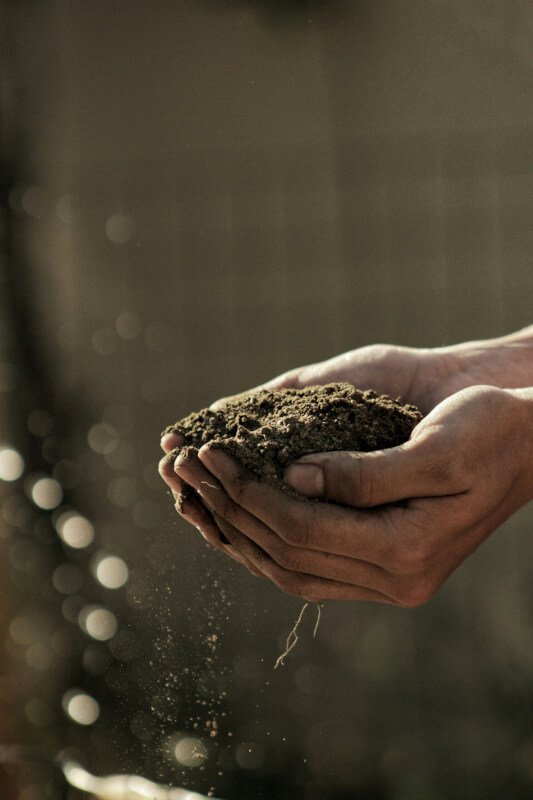
Wooden Garden Sculpture Ideas
Wooden sculptures can add a natural and rustic charm to your garden. Here are some ideas to inspire your wooden sculpture creations:
Wooden Totem Poles
Totem poles have a rich cultural history and can provide a striking visual element in your garden. Carve intricate designs and symbols onto tall wooden poles to create towering sculptures. Each symbol on the totem pole can represent a different aspect of your life, your family, or your connection to nature.
Carved Tree Stumps
If you have a tree stump in your garden, don’t let it go to waste – turn it into a work of art! Carving intricate patterns or sculptural elements onto the surface of the tree stump can transform it into a unique and eye-catching sculpture. Add a sealant or paint to protect the wood and enhance the visual impact of your creation.
Driftwood Sculptures
Driftwood sculptures offer a wonderful way to incorporate the beauty of nature into your garden. Collect pieces of driftwood from beaches or rivers and use them as the foundation for your sculptures. Arrange and attach the driftwood pieces together to create sculptures that evoke the movement of waves, the grace of birds, or the tranquility of a forest.
Wooden Planters with Sculptural Elements
Combine both functionality and artistic expression by creating wooden planters with sculptural elements. Carve or shape the wooden planter into unique and intriguing forms, adding visual interest to your garden. Whether it’s a planter in the shape of an animal or a planter with abstract patterns, it will serve as a stunning focal point while providing a home for your favorite plants.
Wooden Animal Sculptures
Wooden animal sculptures can bring a sense of life and vitality to your garden. Carve or assemble pieces of wood to create accurate or stylized representations of animals. Whether it’s a majestic bird perched on a branch or a playful squirrel hiding in a tree, wooden animal sculptures can add a touch of whimsy and connection to the natural world.
Clay Garden Sculpture Ideas
Working with clay allows you to create sculptures that are both tactile and visually appealing. Here are some ideas to inspire your clay sculpture creations:
Clay Planters with Embossed Patterns
Use clay to create planters with intricate and embossed patterns. Roll out clay slabs and press textured materials, such as leaves or fabric, onto the surface to create interesting imprints. These planters will not only provide a home for your favorite plants but also add a touch of artistic flair to your garden.
Clay Masks and Faces
Clay masks and faces can add an element of mystery and intrigue to your garden. Sculpt expressive faces or create abstract masks and hang them on walls, fences, or trees. The organic nature of clay allows for endless possibilities in expressing emotions and capturing the essence of different characters.
Clay Figurines and Statues
Create clay figurines and statues to bring a sense of life and movement to your garden. Whether you sculpt human figures, animals, or fantastical creatures, clay offers a versatile medium to capture the nuances and details of your subject. These sculptures can be placed on pedestals, within flower beds, or even positioned around a pond to create a whimsical scene.
Clay Mosaic Sculptures
Combine the versatility of clay with the vibrant colors of mosaic art to create stunning sculptures for your garden. Break clay into small pieces and arrange them into intricate patterns or designs. You can create mosaic sculptures of animals, abstract shapes, or even natural landscapes. These sculptures will add a burst of color and visual interest to your outdoor space.
Clay Garden Gnomes
Garden gnomes have always been a popular choice for outdoor sculptures, and clay offers a perfect medium to bring these whimsical characters to life. Sculpt clay gnomes with pointy hats, long beards, and rosy cheeks. You can place them in flower beds, hide them among the foliage, or even create a gnome village in a secluded corner of your garden.
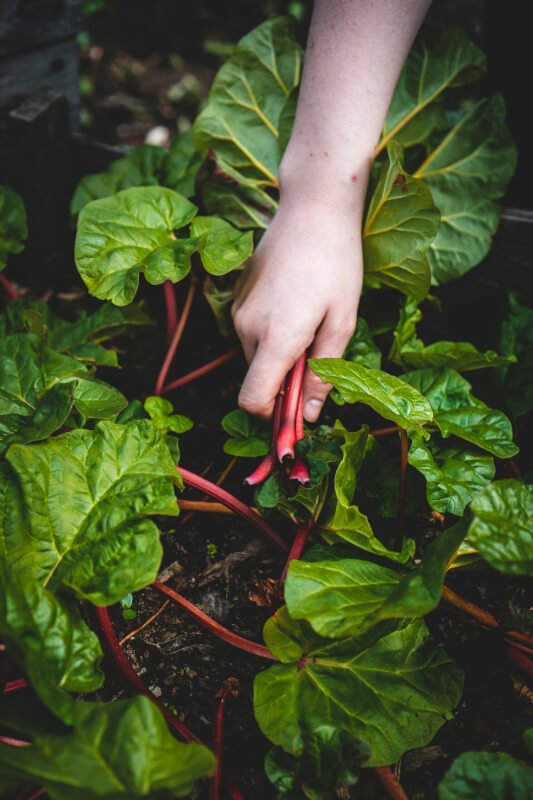
Concrete Garden Sculpture Ideas
Concrete sculptures are durable and adaptable, making them well-suited for outdoor environments. Here are some ideas to inspire your concrete sculpture creations:
Concrete Stepping Stones with Imprints
Create personalized and decorative stepping stones by casting concrete with imprints. Mix concrete according to the manufacturer’s instructions and pour it into shallow molds or forms. Before it sets completely, press objects like leaves, fossils, or even your handprints into the surface to create imprints. The stepping stones can then be arranged along pathways or nestled among plants, adding a charming and personal touch to your garden.
Concrete Planters with Geometric Designs
Concrete planters with geometric designs can add a contemporary and stylish element to your garden. Create forms or molds with interesting geometric shapes, such as cubes, spheres, or cylinders. Pour concrete into these molds and allow it to cure. Once the concrete is set, remove the molds and place your favorite plants within these modern and eye-catching planters.
Concrete Garden Benches with Sculptural Backrests
Combine functionality with artistic expression by creating concrete garden benches with sculptural backrests. Mold and cast a concrete bench seat, ensuring it is wide and comfortable. Then, create a unique and visually striking backrest by either incorporating geometric patterns, abstract designs or even sculptural elements like faces or flowers. These benches will provide a cozy seating area while serving as a captivating focal point in your garden.
Concrete Leaf Castings
Concrete leaf castings offer a unique and naturalistic option for garden sculptures. Coat the surface of a large leaf, such as a hosta or rhubarb leaf, with petroleum jelly. Place the leaf on a raised surface or a bucket and pour concrete mixture carefully over the leaf, ensuring it covers the entire surface. Allow the concrete to cure before removing the leaf to reveal a beautiful and detailed casting. These castings can be placed among plants, next to ponds, or even mounted on walls to create a stunning visual display.
Concrete Sphere Sculptures
Concrete sphere sculptures can add a touch of minimalism and elegance to your garden. Create large or small concrete spheres by either using molds or by casting them directly. The smooth and uniform surface of these spheres can create a visually striking contrast against the foliage of your garden. You can arrange the spheres in a systematic pattern or scatter them throughout your outdoor space for an eclectic look.
Glass Garden Sculpture Ideas
Glass sculptures bring a touch of brilliance and sophistication to your garden. Here are some ideas to inspire your glass sculpture creations:
Stained Glass Mosaic Sculptures
Stained glass mosaic sculptures can create a dazzling display of color and light in your garden. Break stained glass into small pieces, either randomly or in specific shapes, and arrange them onto a substrate, such as concrete or wood. Use an adhesive to secure the glass pieces in place, and then grout between the pieces to create a firm and durable mosaic sculpture. These sculptures will sparkle and shine as sunlight passes through the colored glass, creating a captivating and magical effect.
Glass Bottle Sculptures
Recycle glass bottles into unique and eye-catching sculptures for your garden. Collect bottles of various shapes and sizes and assemble them together using strong adhesive or wire. You can create sculptures that mimic the shapes of flowers, butterflies, or even abstract designs. Install these bottle sculptures on sturdy stands or hang them from trees or pergolas to create an enchanting and eco-friendly display.
Glass Birdbaths with Sculptural Elements
Glass birdbaths provide not only a functional source of water for birds but also a beautiful sculptural element in your garden. Repurpose glass bowls or plates and attach them to a sturdy base using a suitable adhesive. To add visual interest, incorporate sculptural elements such as glass flowers, leaves, or even small figurines into the design. Place the glass birdbath in a quiet and safe area of your garden, ensuring it is filled with clean water to attract and nourish avian visitors.
Glass Wind Chimes
Create mesmerizing melodies in your garden by making glass wind chimes. Collect glass pieces of various colors and shapes, and attach them to a sturdy metal or wooden frame using fishing line or wire. Hang the wind chimes from trees, pergolas, or even in a sheltered area of your garden where they can catch the breeze and produce soothing sounds. The delicate tinkling of the glass pieces will create a harmonious and tranquil atmosphere.
Fused Glass Sculptures
Fused glass sculptures offer a contemporary and modern approach to garden art. Cut and arrange glass pieces into desired shapes and designs, and then fuse them together in a kiln to create a solid and durable sculpture. The vibrant colors and sleek finishes of fused glass sculptures can add a touch of sophistication and elegance to your outdoor space. Whether it’s a large-scale installation or a small tabletop piece, fused glass sculptures will definitely make a statement.
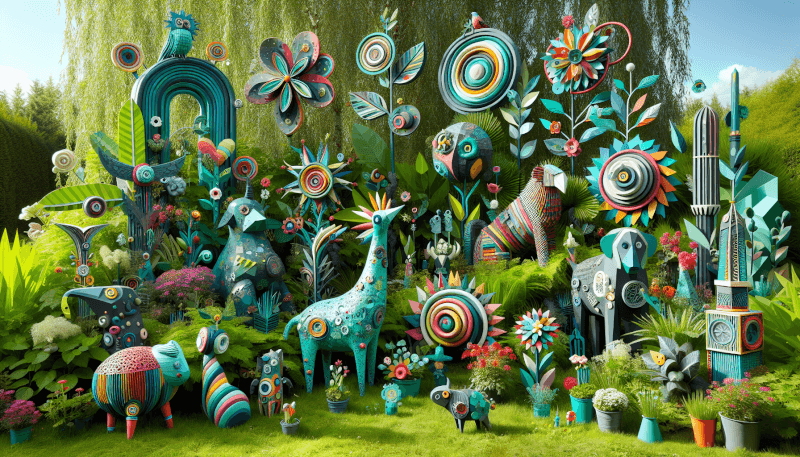
Installation and Maintenance Tips for Garden Sculptures
Once you have created your garden sculptures, it’s important to take proper care and ensure their longevity. Here are some installation and maintenance tips to consider:
Choosing the Right Location
Carefully choose the location for your garden sculptures to maximize their visual impact and ensure their safety. Consider the scale and proportions of the sculptures in relation to the surrounding landscape. Place larger sculptures in areas where they can be viewed from a distance, and smaller sculptures in areas where they can be discovered up close. Take into account factors such as sunlight, wind exposure, and the overall aesthetic of your garden.
Securing Sculptures to Prevent Damage
Secure your sculptures to prevent them from being damaged by strong winds or accidental bumps. Depending on the size and weight of the sculptures, you can use stakes, anchors, or even concrete bases to secure them to the ground. For freestanding sculptures, ensure that their bases are stable and level to avoid any tipping or wobbling. Consider using additional supports or brackets for sculptures that are attached to walls, fences, or pergolas.
Cleaning and Maintenance Guidelines
Regularly clean your garden sculptures to maintain their appearance and prevent the buildup of dirt, debris, or organic matter. Use mild soap and water to gently wash the surfaces, or follow specific cleaning instructions if your sculptures are made of materials like glass or metal. Avoid using harsh chemicals or abrasive materials that may damage the sculptures. Periodically check for signs of wear or damage, and repair or refinish as needed.
Protecting Sculptures from Harsh Weather
Protect your garden sculptures from the damaging effects of harsh weather conditions. Apply appropriate sealants, varnishes, or coatings to protect sculptures made from wood, metal, or other materials from moisture, UV rays, and temperature fluctuations. Consider covering or temporarily relocating sculptures during extreme weather events, such as heavy rain, snow, or hail, to prevent potential damage. Taking proactive measures to protect your sculptures will ensure their longevity and retain their visual appeal.
Artificial Lighting for Nighttime Display
Enhance the visual impact of your garden sculptures by installing artificial lighting. Well-placed spotlights or landscape lights can create dramatic effects and highlight the sculptures during nighttime. Experiment with different lighting angles, colors, or even solar-powered lights to enhance the ambiance and create an enchanting atmosphere. Adding artificial lighting to your garden will allow you and your guests to enjoy the beauty of your sculptures even after the sun goes down.
Conclusion
Creating DIY garden sculptures is a wonderful way to express your creativity and add a personal touch to your outdoor space. Whether you choose to work with metal, wood, clay, concrete, or glass, each material offers its own unique qualities and possibilities. By exploring different sculpture techniques and design inspirations, you can bring your artistic vision to life and create sculptures that reflect your personal style and enhance the beauty of your garden. With proper installation, maintenance, and care, your garden sculptures will bring joy and artistic expression to your outdoor oasis for years to come. So, grab your tools, materials, and let your imagination soar as you embark on your journey of creating DIY garden sculptures!
